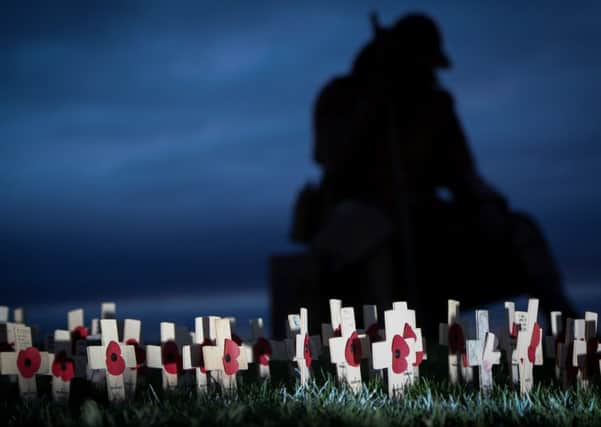Sir Hugh Bayley: The EU is key to Britain's defence and security


The first duty of any government is security – to protect its citizens from war, terrorism and similar threats.
In an interconnected world, security can no longer be provided by one country acting alone.
Advertisement
Hide AdAdvertisement
Hide AdWe have to make agreements – treaties – with other countries to share information, pool resources like military assets, come to each other’s aid in times of crisis, and settle disputes through compromise rather than conflict.
The European Union is one of these international treaty bodies, and Britain would be less secure and less able to call on other countries to help us when we need it – if we were to quit the EU.
After the Second World War, politicians created three international institutions – the United Nations, Nato and the European Union – which have been critically important in keeping peace (most of the time) in Europe.
It is hard for people nowadays to comprehend the loss of life in the world wars. Some 100 million people were killed, including one and a quarter million British servicemen and women.
Advertisement
Hide AdAdvertisement
Hide AdThat is 100,000 killed a year, compared to fewer than 4,000 British service personnel killed in the 70 years since the Second World War – in Korea, Suez, Northern Ireland, the Falklands, Iraq, Afghanistan and elsewhere. There are people in the “Leave” campaign who argue that our special relationship with the United States does more for our security than the EU.
But President Obama, backed by former US foreign and defence secretaries from both political parties, warn us that the special relationship would be greatly weakened if we in the UK were to leave the EU.
The special relationship does not exist because the UK and USA share a language, some history – for example fighting together in both world wars – and some aspects of our legal systems.
It exists today because we both continue to benefit from the relationship.
Advertisement
Hide AdAdvertisement
Hide AdThe US provides intelligence and military assistance to us.
Amongst other things, this reduces our defence spending to two per cent of our national income – compared to 10 per cent in 1952, the year when I was born.
In return we are one of America’s most trusted allies in Europe. The EU matters to the US – because of security, trade and our shared values on democracy, human rights, freedom of speech and the rule of law. If we were to quit the EU, the US would spend less time working with us, and more with other EU big hitters – like Germany and France.
Leave campaigners point out, correctly, that we would stay in Nato if we left the EU. But Nato doesn’t work in a vacuum. It needs the EU.
Advertisement
Hide AdAdvertisement
Hide AdFor example: When Russia annexed Crimea and sent soldiers and military equipment into eastern Ukraine, including the missile which shot down Malaysian Airlines flight 17 from Amsterdam killing all 298 people on board, Nato and the EU knew that Russia had to be shown that seizing parts of neighbouring countries is unacceptable.
So Nato deployed military assets to deter Russian aggression, including UK warplanes sent to guard Baltic airspace, and the EU, under strong pressure from the UK, imposed economic sanctions against Russia and made plans to reduce European dependency on Russian oil and gas.
Russia has scaled back its war by proxy in eastern Ukraine. The conflict isn’t over but it needed both EU economic, and Nato military, pressure to change President Putin’s approach. When al-Qaida rebels came within days of toppling the government in Mali, West Africa, France intervened militarily to drive them back and restore an elected government.
The UK and US provided military assistance to France, but the military component of the post-war reconstruction of Mali is provided by the EU, not Nato.
Advertisement
Hide AdAdvertisement
Hide AdWhen I questioned our then rather Eurosceptic Foreign Secretary, Philip Hammond, about this before I left the House of Commons, he said, without blushing, that the EU was better suited to the job. And so it is.
Nato is better at hard-edged military missions, and the EU better at building political institutions – like defence ministries and providing military training in developing countries once a war is over.
It is valuable for Britain to have a say over EU foreign policy. We would be less safe if we relied only on Nato’s military assets. It is always better to use diplomacy, than warfare, to resolve conflict between countries, provided you retain the military muscle as a deterrant and to use as the last resort.
The EU is not perfect. Nor are Nato or the United Nations. They do not always achieve what we want. But we achieve more by staying involved and arguing our case within these international bodies, which is why I shall be voting for Britain to remain in the EU.
Sir Hugh Bayley was MP for York from 1992-2015 and President of the Nato Parliamentary Assembly.